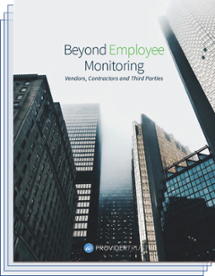The healthcare industry is broadening its spectrum of providers and types of services in order to meet the needs of an aging population in the United States. Healthcare providers are leveraging more community-based and home health services to reduce costs and optimize convenience and patient experience. Market pressures are driving healthcare companies to offer creative and practical solutions for patients utilizing the latest technology and care models.
Companies and individuals that offer Personal Care Services (PCS) to aid those in need of certain basic life functions and necessities that they can no longer perform on their own are reimbursed through government healthcare programs. The growth in these services has produced risk of fraudulent activity, improper payments, and beneficiary vulnerabilities. In this post, we’ll explore some of the main problems that HHS OIG, CMS, providers, and the healthcare community are looking to solve with personal care and home health services.
Top Vulnerabilities of Personal Care and Home Health Services
- PCS Attendant Identification and Standard Documentation of Care
- PCS Fraudulent Schemes or Improper Payments
- CMS Abilities to Recover Improper or Overpayment for Home Health Services
What are Personal Care Services (PCS)?
According to HHS OIG, Personal Care Services provide a “benefit for the elderly, people with disabilities, and people with chronic or temporary conditions. It assists them with activities of daily living and helps them remain in their homes and communities.” Examples of PCS include bathing, dressing, light housework, money management, meal preparation, transportation, and more.
Personal care services do not include skilled services that only a health professional may perform (e.g., home health aide services, physical therapy, occupational therapy, and speech and language therapy). Personal care services cannot be provided to individuals who are patients or residents in hospitals, nursing facilities, intermediate care facilities for persons with mental disabilities, or psychiatric institutions.
PCS Attendant Identification and Standard Documentation of Care
What are Personal Care Service Attendants?
According to HHS OIG, Personal Care Service attendants, “enable the elderly, people with disabilities, and other individuals with chronic or temporary conditions to remain in their homes by assisting them with daily activities (e.g., bathing, dressing, meal preparation, and grocery shopping).”
Attendants typically are unlicensed individuals who provide services in beneficiaries’ homes. There are no federal requirements for personal care service attendants to deliver care to beneficiaries.
State Requirements for PCS Attendants
HHS OIG completed a report entitled, States’ Requirements for Medicaid-Funded Personal Care Service Attendants and explained that “despite the explosive growth in Medicaid personal care services, little is known about the requirements placed on personal care service attendants and oversight of state-established requirements.”
The CMS State Medicaid Manual requires each state to develop qualifications or requirements for attendants to ensure quality of care. Requirements for attendants vary drastically between each state. Most states typically include background checks, training, age, supervision, health, and education/literacy in their evaluation requirements for becoming a PCS attendant. However, definitions and elements of each requirement per each state are not uniform.
For example, a background check requirement in one program could include conducting a national criminal background check, checking abuse and neglect registries, and/or checking federal or state exclusion lists. In another program, the background check requirement could include only checking references. Even when two programs require a criminal background check, one may bar an attendant for certain offenses while the other may allow an attendant with the same offenses to provide services.
OIG Recommendations for PCS Attendants to CMS
In order to better assess proper attendant requirements, potential fraudulent activities, or patient abuse, OIG recommends that CMS should require states to either enroll PCS attendants as providers or require PCS attendants to register with their state Medicaid agencies and assign each attendant a unique identifier.
In addition, OIG recommended the following to CMS for PCS oversight improvements:
- Promulgate regulations to reduce significant variation in States’ PCS laws and regulations by creating or expanding Federal requirements and issuing operational guidance for claims documentation, beneficiary assessments, plans of care, and supervision of attendants.
- Promulgate regulations to reduce significant variation in State PCS attendant qualification standards and the potential for beneficiary exposure to unqualified PCS attendants by establishing minimum Federal qualification standards applicable to all PCS reimbursed by Medicaid.
In response to OIG recommendations, CMS “continues to have internal deliberations on the feasibility of requiring unique identifiers for PCS attendants and the reflection of their identity on PCS claims. In addition, the Cures Act mandated that States implement an electronic visit verification system for all Medicaid PCS by January 1, 2020.”
In regard to regulation recommendations, CMS’s “analysis and discussions with stakeholders concluded that states should retain discretion on supervision parameters and establishing provider qualifications for PCS attendants, and OIG agreed to close the recommendation.”
PCS Fraudulent Schemes or Improper Payments
HHS OIG Reviews of Personal Care Services
Last spring, HHS OIG suggested changes to Personal Care Services in its Top Recommendations to Reduce Fraud, Waste, and Abuse (FWA) in HHS Programs.
In 2016, HHS OIG produced an Investigative Advisory Report on Medicaid Fraud and Patient Harm Involving Personal Care Services. According to OIG, the advisory report “identifies concerns about fraud and patient harm that build upon those outlined in a portfolio report issued in November 2012, Medicaid Personal Care Services: Trends, Vulnerabilities, and Recommendations for Improvement (OIG-12-12-01).”
Since the portfolio was issued in 2012, OIG has opened more than 200 federal criminal investigations involving fraud and patient harm and neglect in the PCS program across the country and has included PCS cases as part of national healthcare fraud takedowns in 2015 and 2016. OIG investigations have revealed a variety of billing fraud scenarios, some of which are limited to individual PCS workers, while others indicate organized schemes involving dozens of suspects. OIG investigations have also shown that abuse and neglect by PCS attendants have resulted in deaths, hospitalizations, and less severe degrees of patient harm. PCS beneficiaries are an especially vulnerable population, and stronger controls are needed to screen and monitor PCS attendants and the program.
MFCU Recommendations for Vulnerabilities in PCS Program
In 2015 alone, fraud cases for PCS accounted for 12% of total MFCU investigations. HHS OIG takes MFCU reporting into consideration for CMS recommendations and continues to report on the seriousness of PCS program issues in its monthly Work Plan items.
In 2017, HHS OIG released an Issue Brief describing PCS program evaluations from Medicaid Fraud Control Units (MFCUs) throughout the country. The document provided statistics from review periods that showcase increasing issues in program integrity, beneficiary safety, lack of oversight, and more. In general, MFCUs lack the federal funding authority to pursue abuse or neglect of beneficiaries that occurs in beneficiaries’ homes—the location where PCS is often provided.
Hope Falowo of Maryland recently pled guilty to a federal charge of healthcare fraud stemming from a scheme in which she caused the District of Columbia’s Medicaid program to be defrauded out of approximately $400,000. Ms. Falowo worked as a personal care aide for a dozen different home health agencies between January 2013 and March 2017.
CMS Abilities to Recover Overpayments for Home Health Services
According to OIG, “The Medicare home health benefit has long been recognized as a program area vulnerable to fraud, waste, and abuse. The benefit was established to provide skilled nursing care, home-based assistance, and therapeutic services to qualifying homebound individuals. Home health care represents a significant component of Medicare expenditures. In the calendar year 2015, Medicare reimbursed over 11,000 distinct home health agencies (HHAs) for almost 7 million episodes of home health care, totaling approximately $18.7 billion.”
The high growth of Home Health Agencies (HHAs) combined with inefficiencies and vulnerabilities within CMS’ governance of home health benefits has led to increasing amounts of overpayments to HHAs. For years, OIG has suggested that CMS implement surety bonds for HHAs to better control recoupment from Medicare Administrative Contractors (MACs) in accordance with the Balanced Budget Act (BBA) of 1997.
Throughout the years, OIG has recognized “CMS’s tracking and collection of overpayments, identifying vulnerabilities that highlight the need for CMS to be more effective in its recoupment efforts. The surety bond requirement is not the only tool that CMS can use to protect the program from vulnerabilities in the home health benefit. However, requiring the use of surety bonds would discourage fraudulent HHAs’ entry into the program and guarantee CMS’s ability to recoup some portion of overpayments.”
Providing Smarter and Safer Healthcare
ProviderTrust is committed to helping protect patients and inform healthcare organizations of potential risks involved in their provider populations. Our solutions help build complete profiles for many types of individuals and entities who contribute to federal healthcare programs.
We’ve built tools to help collect, augment, and verify government and provider data for your organization to make the most informed decisions.
To learn more, Contact Us today!
Check out our latest resources!


Written by Michael Rosen, Esq.
Michael brings over 20 years of experience founding and leading risk mitigation businesses, receiving numerous accolades such as Inc. Magazine’s Inc. 500 Award and Nashville Chamber of Commerce Small Business of the Year.







